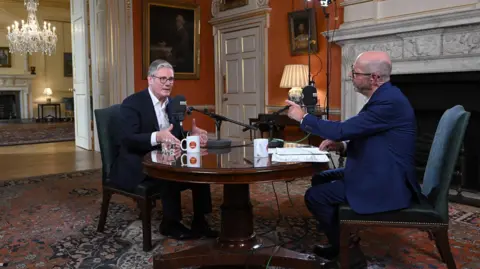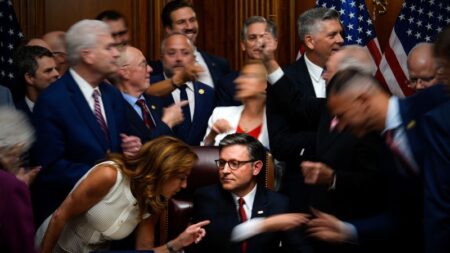In a recent interview, Keir Starmer, the current Prime Minister of the United Kingdom, reflected on his first year in office, revealing a mixture of confidence and concern. The conversation took place in the prestigious Terracotta Room at 10 Downing Street, a location symbolizing the weight of his responsibilities as leader. As he welcomed the interviewer, the atmosphere was surprisingly relaxed, despite the recent emotional turmoil within his cabinet, particularly relating to his Chancellor, Rachel Reeves. Just hours prior to this meeting, Reeves was seen in tears in the Commons, igniting speculation about her future and causing fluctuations in the currency market. This continuing instability seems to be a backdrop against which Starmer is trying to steer his administration.
Starmer has been keen on presenting a balanced perspective on his leadership, determined not to let the challenges he faces overshadow his government’s achievements. He highlighted significant advancements, particularly in the National Health Service (NHS), where he claims waiting lists have significantly decreased. Additionally, he mentioned improvements in schools and various child support initiatives, noting efforts like the implementation of school meal programs and breakfast clubs. Furthermore, Starmer pointed out his administration’s successful negotiation of three international trade deals, emphasizing a narrative of progress amidst the political storms surrounding him.
However, the interview took a turn when the subject shifted to the mistakes made during his term. Starmer candidly admitted to errors in judgment, particularly regarding the hiring of his former chief of staff, Sue Gray. The conversation highlight issues surrounding the phasing out of winter fuel payments, the dismissal of a national inquiry into grooming gangs, and cuts to benefits for disabled individuals. Each of these decisions has faced considerable backlash and has been viewed by the public as detrimental to the party’s credibility.
In an attempt to contextualize these stumbling blocks, Starmer defended his pragmatic approach to leadership, arguing against the notion that changing one’s mind signifies weakness. It is an ideology that he feels is often misrepresented in Westminster’s political discourse, which tends to label such shifts as “humiliating U-turns.” He emphasized that he is not bound by a strict ideology but rather responds to new information and changing circumstances. This self characterization points to a willingness to adapt in the face of new challenges, but it also raises questions about consistency and trustworthiness.
Starmer’s acknowledgment of a costly reassessment of welfare reforms adds another layer to this dialogue. He took ownership of the realities behind these policy decisions, admitting that losing £5 billion in planned savings complicates the future financial landscape for his government. While claiming responsibility, he suggested that other party members should have been more aligned with his vision, thus subtly deflecting total accountability.
The interviewer pressed on with the idea of narrative and leadership, questioning Starmer about the need for a compelling story to connect with voters. This line of inquiry exposed a possible vulnerability in his administration’s messaging strategy. Rather than painting a picture of an inspiring vision for the nation, Starmer’s focus on pragmatism and technical details may not resonate as well with the broader electorate seeking purpose and direction. In response, Starmer spoke of his passion for improving fairness and equality in society, highlighting a moral framework suggesting that every worker deserves a reciprocal relationship with their government.
As the discussion wrapped up, Starmer faced the issue of whether he had lost the support of his party, a common concern in political circles often associated with falling popularity. He, however, vehemently claimed that he still commands respect from the parliamentary Labour Party, despite challenges and frustrations that detract from their accomplishments.
In conclusion, while Keir Starmer presents himself as a determined leader ready to face challenges head-on, the current perceptions of his governance suggest a precarious situation. The public sentiment and internal party dynamics paint a daunting picture, posing questions about the future trajectory of his leadership amid a landscape full of uncertainties and discontent. Despite his defiant stance, there is little doubt that many are observing closely how he navigates the considerable hurdles ahead.











